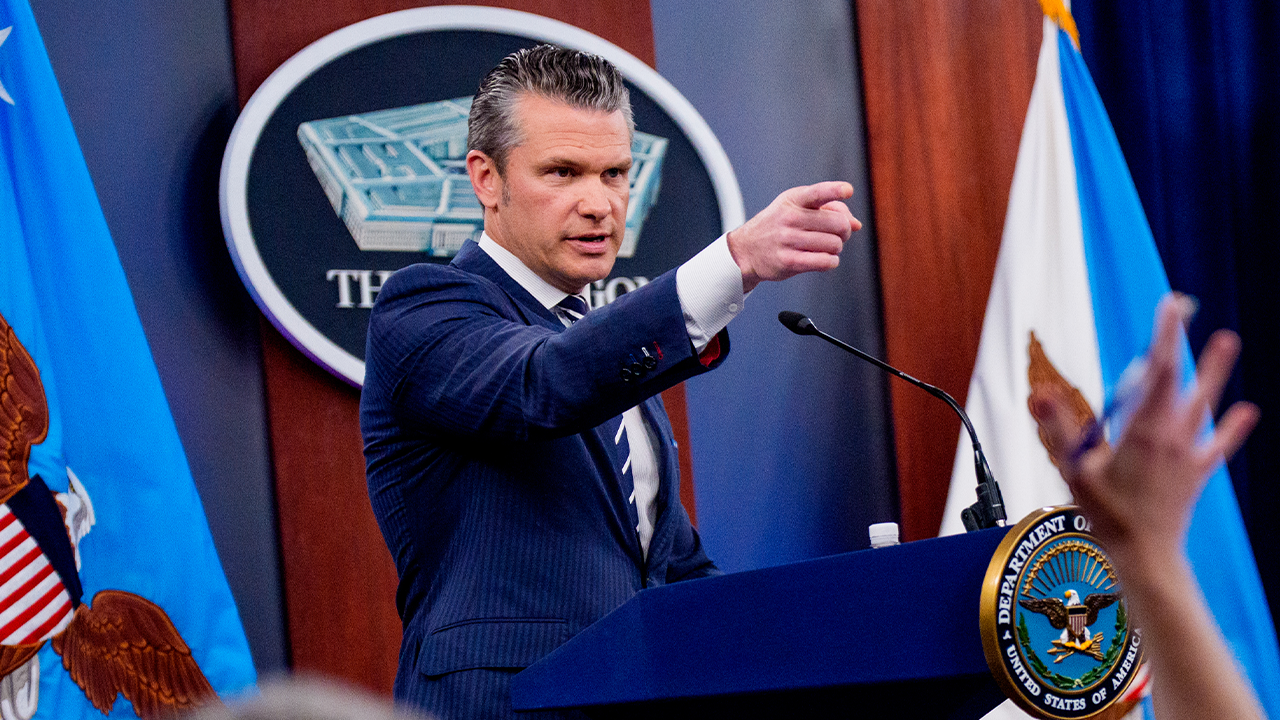
Defense bill bans males from women's sports at military academies
Entities mentioned:
- U.S. Congress: Duty, Competitive spirit, Control
- President Donald Trump: Power, Influence, Legacy
- Rep. Mike Rogers: Righteousness, Determination, Loyalty
- Pentagon: Control, Security, Professional pride
- Senate Majority Leader John Thune: Duty, Competitive spirit, Security
Article Assessment:
Credibility Score: 70/100
Bias Rating: 65/100 (Lean Right)
Sentiment Score: 55/100
Authoritarianism Risk: 60/100 (Mixed/Neutral)
Bias Analysis:
The article leans right, emphasizing conservative policy wins and framing transgender exclusion positively. Sources are mostly Republican, with limited opposing viewpoints presented.
Key metric: Military Readiness and Cohesion
Let me tell you something - this legislative play is a GAME-CHANGER! Congress is stepping up to the plate with a $901 billion defense package that's loaded with more plays than a championship playbook. The real MVP move here is banning biological males from women's sports at military academies. It's like they're calling an audible at the line of scrimmage, folks! This is about maintaining a level playing field and team cohesion in our armed forces. The Trump administration is running a full-court press on transgender policies, and Congress is backing that defensive strategy all the way. We're seeing a full-team effort here to reinforce the fundamentals of biological differences in athletic competition. It's a bold move in the fourth quarter of 2025, and it's clear they're playing to win on national security. This is the kind of competitive edge and strategic thinking that keeps America in the game on the global stage!

Trump to attend Commanders game against Lions to honor military veterans
Entities mentioned:
- Donald Trump: Recognition, Influence, Legacy
- Washington Commanders: Professional pride, Unity, Loyalty
- Josh Harris: Duty, Recognition, Unity
- Pat McAfee: Competitive spirit, Recognition, Influence
- Pentagon: Duty, Security, Control
Article Assessment:
Credibility Score: 75/100
Bias Rating: 55/100 (Center)
Sentiment Score: 60/100
Authoritarianism Risk: 35/100 (Generally Democratic)
Bias Analysis:
The article presents a fairly balanced view, including both positive and potentially controversial aspects of Trump's attendance. It cites multiple sources and provides context from different perspectives.
Key metric: Public Perception of Military Support
Let me tell you something, folks - this is a GAME-CHANGING play in the political arena! President Trump is stepping up to the plate, making a fourth-quarter move to show his support for our military veterans. It's like he's suiting up for the big game, ready to take the field alongside the Commanders. But here's the kicker - the Pentagon's budget shutdown is like a major penalty, taking away the traditional flyovers. It's crunch time, and Trump's looking to score some serious points with the military crowd. The Commanders are playing host, but they've got their own challenges, coming off a tough loss and without their star QB. This is the kind of high-stakes matchup that separates the champions from the also-rans. I'm telling you right now, all eyes will be on that owner's box come Sunday!

Pentagon cancels military events for NFL 'Salute to Service' weekend due to government shutdown
Entities mentioned:
- Pentagon: Duty, Obligation, Security
- NFL: Professional pride, Recognition, Loyalty
- U.S. Government: Control, Power, Self-preservation
- Anna Isaacson: Professional pride, Loyalty, Duty
Article Assessment:
Credibility Score: 75/100
Bias Rating: 55/100 (Center)
Sentiment Score: 35/100
Authoritarianism Risk: 25/100 (Generally Democratic)
Bias Analysis:
The article presents a fairly balanced view, quoting both Pentagon and NFL sources. It sticks to factual reporting without pushing a particular political agenda on the shutdown.
Key metric: Military-Civilian Relations
Let me tell you something - this government shutdown is throwing a MAJOR PENALTY FLAG on the NFL's 'Salute to Service' game plan! The Pentagon's been SACKED by budget constraints, forcing them to bench all military events for this patriotic pigskin weekend. It's like the defense has left the field, folks! No more thrilling flyovers, no more honor guards stepping up to the plate, and forget about that giant American flag unfurling like a game-winning touchdown celebration. The NFL's trying to maintain their ground game, but without their star players from the armed forces, they're facing a serious fourth-quarter challenge. This shutdown's gone into OVERTIME, breaking records like it's gunning for the Hall of Fame of governmental gridlock. But I'm telling you right now, the NFL's not throwing in the towel - they're digging deep into their playbook to keep honoring our troops, even if Uncle Sam's been sent to the locker room!

Fighter pilots take directions from AI in Pentagon’s groundbreaking test
Entities mentioned:
- U.S. Fighter Pilots: Duty, Professional pride, Security
- Pentagon: Security, Competitive spirit, Influence
- Air Force: Security, Professional pride, Competitive spirit
- Navy: Security, Professional pride, Competitive spirit
- Raft AI: Ambition, Innovation, Recognition
- Shubhi Mishra: Ambition, Recognition, Influence
- Federal Aviation Administration (FAA): Security, Duty, Professional pride
- National Transportation Safety Board: Duty, Security, Professional pride
Article Assessment:
Credibility Score: 75/100
Bias Rating: 55/100 (Center)
Sentiment Score: 65/100
Authoritarianism Risk: 35/100 (Generally Democratic)
Bias Analysis:
The article presents a balanced view of the AI technology, discussing both its potential benefits and ethical concerns. While it leans slightly towards emphasizing the positive aspects, it also includes cautionary notes about human involvement in critical decisions.
Key metric: Military Technological Advantage
As a social scientist, I analyze that this article highlights a significant advancement in military technology, specifically in air combat management. The integration of AI into fighter pilot operations represents a potential paradigm shift in warfare strategy. This development could dramatically enhance the U.S. military's decision-making speed and accuracy in air combat scenarios, potentially providing a substantial edge over adversaries. However, it also raises ethical questions about the role of AI in life-or-death decisions and the future of human involvement in combat operations. The test's success suggests a trend towards increased AI integration in military operations, which could have far-reaching implications for national defense strategies, international military dynamics, and the nature of future conflicts. The emphasis on maintaining human oversight indicates a cautious approach to this technological integration, balancing innovation with ethical considerations.

Bolton unleashes on Trump Ukraine policy days after FBI raid
Entities mentioned:
- John Bolton: Revenge, Self-preservation, Justice
- Donald Trump: Power, Recognition, Legacy
- FBI: Duty, Justice, Security
- Vladimir Putin: Power, Control, Influence
- Pentagon: Security, Control, Professional pride
Article Assessment:
Credibility Score: 65/100
Bias Rating: 55/100 (Center)
Sentiment Score: 30/100
Authoritarianism Risk: 35/100 (Generally Democratic)
Bias Analysis:
The article presents multiple viewpoints, including criticisms of Trump's policies, but relies heavily on Bolton's perspective. While it includes some factual reporting, the emphasis on Bolton's critique slightly tilts the balance, though not significantly enough to be classified as partisan.
Key metric: International Relations and Diplomacy
As a social scientist, I analyze that this article highlights significant tensions in U.S. foreign policy, particularly regarding Ukraine and Russia. Bolton's critique of Trump's approach suggests a lack of coherence and strategy in diplomatic efforts, potentially weakening the U.S. position on the global stage. The reported FBI raid on Bolton's property adds another layer of complexity, indicating potential internal conflicts within the U.S. political establishment. This situation could impact U.S. credibility in international negotiations and alliances, especially concerning Eastern European security dynamics. The discord between different branches of government (White House, Pentagon) on Ukraine policy further underscores the challenges in maintaining a unified and effective foreign policy stance.

DC arrests surpass 1,000 as Trump-backed crackdown enters 12th homicide-free day
Entities mentioned:
- John Bolton: Revenge, Self-preservation, Indignation
- Donald Trump: Power, Recognition, Legacy
- FBI: Justice, Duty, Professional pride
- Vladimir Putin: Power, Control, Influence
- Pentagon: Security, Control, Professional pride
Article Assessment:
Credibility Score: 70/100
Bias Rating: 55/100 (Center)
Sentiment Score: 30/100
Authoritarianism Risk: 35/100 (Generally Democratic)
Bias Analysis:
The article presents multiple viewpoints, including critical perspectives of Trump's policies, but also includes Trump's actions without overtly positive or negative framing. While it leans slightly towards criticism, it maintains a relatively balanced approach by presenting factual information from various sources.
Key metric: International Relations and Diplomacy
As a social scientist, I analyze that this article highlights significant tensions in U.S. foreign policy, particularly regarding the Ukraine conflict. Bolton's critique of Trump's approach suggests a lack of coherence and strategy in diplomatic efforts, potentially weakening the U.S. position on the global stage. The reported FBI raid on Bolton's property adds another layer of complexity, indicating potential internal conflicts within the U.S. political establishment. This situation could have far-reaching implications for U.S. credibility in international negotiations and its relationships with allies. The article also touches on the delicate balance of power between different branches of government, particularly the executive and law enforcement agencies, which could impact the effectiveness of U.S. foreign policy implementation.

Federal judge orders closure of Trump’s ‘Alligator Alcatraz’ immigration jail
Entities mentioned:
- Donald Trump: Power, Control, Legacy
- Federal judge: Justice, Duty, Righteousness
- Immigration and Customs Enforcement (ICE): Control, Security, Duty
- Trump administration: Power, Control, Influence
- US military: Duty, Security, Obligation
- Pentagon: Security, Duty, Control
- ACLU: Justice, Freedom, Moral outrage
Article Assessment:
Credibility Score: 65/100
Bias Rating: 35/100 (Lean Left)
Sentiment Score: 30/100
Authoritarianism Risk: 65/100 (Authoritarian Tendencies)
Bias Analysis:
The article leans left in its framing, focusing on challenges to Trump administration policies and highlighting opposition. While it presents factual information, the selection of stories and language used suggests a critical stance towards the administration's actions.
Key metric: Immigration Enforcement Effectiveness
As a social scientist, I analyze that this article highlights significant tensions between the Trump administration's aggressive immigration policies and judicial oversight. The closure of the 'Alligator Alcatraz' immigration jail by a federal judge suggests a pushback against what may be perceived as overly harsh or potentially unconstitutional detention practices. This decision, along with other reported actions such as cutting California's sex-education funds over gender identity references and the military identifying 'hotels to avoid' due to protests, indicates a pattern of resistance to the administration's policies from various sectors including the judiciary, state governments, and civil society. The involvement of the Pentagon in asking civilian employees to aid ICE deportations further underscores the administration's commitment to its immigration agenda, potentially blurring lines between civilian and military roles in domestic law enforcement. This could have significant implications for the effectiveness and public perception of immigration enforcement efforts, potentially leading to increased polarization and legal challenges.

Trump targets Chicago and New York as Hegseth orders weapons for DC troops
Entities mentioned:
- Donald Trump: Power, Control, Influence
- Pete Hegseth: Loyalty, Duty, Security
- Pentagon: Control, Security, Obligation
- Ukraine: Self-preservation, Justice, Freedom
- Zohran Mamdani: Ambition, Recognition, Influence
- Marjorie Taylor Greene: Moral outrage, Righteousness, Influence
- Bernie Sanders: Justice, Moral outrage, Influence
- Kilmar Ábrego García: Self-preservation, Fear, Security
- Gavin Newsom: Competitive spirit, Ambition, Recognition
- Arnold Schwarzenegger: Justice, Legacy, Influence
- Ghislaine Maxwell: Self-preservation, Loyalty, Fear
Article Assessment:
Credibility Score: 70/100
Bias Rating: 40/100 (Lean Left)
Sentiment Score: 35/100
Authoritarianism Risk: 45/100 (Mixed/Neutral)
Bias Analysis:
The article leans slightly left, evidenced by more coverage of Democratic figures and initiatives. While it includes some Republican perspectives, the framing tends to be more critical of conservative positions.
Key metric: Political Polarization Index
As a social scientist, I analyze that this article highlights increasing political polarization in the United States. The content spans various political issues, from immigration and foreign policy to electoral politics and social issues. Trump's continued influence on Republican politics is evident, while Democratic figures are positioning themselves in opposition. The mention of partisan redistricting, sanctuary city policies, and contrasting approaches to issues like the Gaza conflict and offshore wind farms underscore deep divisions along party lines. This polarization is likely to impact governance, policy-making, and social cohesion, potentially leading to increased gridlock and decreased ability to address national challenges effectively.

National Guard troops in Washington, DC, begin carrying weapons
Entities mentioned:
- US National Guard: Duty, Security, Control
- Defense Secretary Pete Hegseth: Power, Control, Duty
- President Donald Trump: Power, Control, Legacy
- Pentagon: Security, Control, Duty
- Metropolitan Police Department: Security, Control, Duty
Article Assessment:
Credibility Score: 75/100
Bias Rating: 55/100 (Center)
Sentiment Score: 35/100
Authoritarianism Risk: 70/100 (Authoritarian Tendencies)
Bias Analysis:
The article presents a relatively balanced view, including both administration justifications and critical context. However, there's a slight lean towards skepticism of the administration's claims, particularly in highlighting the discrepancy between Trump's rhetoric on rising crime and actual crime statistics.
Key metric: Domestic Security and Law Enforcement
As a social scientist, I analyze that this article highlights a significant shift in the militarization of domestic law enforcement in Washington, DC. The deployment of armed National Guard troops, along with the federal takeover of the city's police department, represents an unprecedented level of federal intervention in local affairs. This move, justified under the guise of crime reduction and beautification, raises concerns about the balance of power between federal and local authorities. The emphasis on arming troops and creating 'specialized units' suggests a potential escalation in the use of force against civilians, which could have far-reaching implications for civil liberties and the nature of policing in the capital.

Hegseth orders National Guard troops in DC to carry weapons
Entities mentioned:
- Pete Hegseth: Control, Security, Duty
- National Guard: Duty, Security, Obligation
- Donald Trump: Power, Control, Legacy
- Pentagon: Security, Control, Professional pride
- Joint Task Force - DC: Security, Duty, Control
Article Assessment:
Credibility Score: 70/100
Bias Rating: 55/100 (Center)
Sentiment Score: 35/100
Authoritarianism Risk: 65/100 (Authoritarian Tendencies)
Bias Analysis:
The article presents factual information from official sources but lacks diverse perspectives on the implications of this decision. While it doesn't overtly endorse the move, the framing subtly emphasizes the administration's security narrative without significant critical analysis.
Key metric: Domestic Security and Public Safety
As a social scientist, I analyze that this decision to arm National Guard troops in Washington, DC represents a significant escalation in the federal government's approach to domestic security. This move suggests an intensification of the administration's 'law and order' stance, potentially impacting civil liberties and the balance between security and individual freedoms. The involvement of multiple states' National Guard units indicates a nationalization of what is ostensibly a local law enforcement matter, raising questions about federalism and the appropriate use of military personnel in civilian policing roles. This development may lead to increased tensions between protesters and authorities, potentially exacerbating rather than alleviating social unrest.